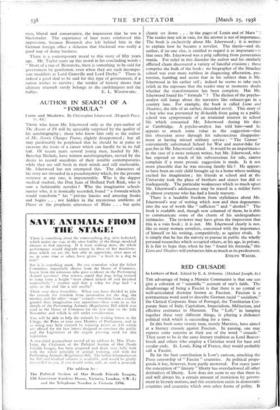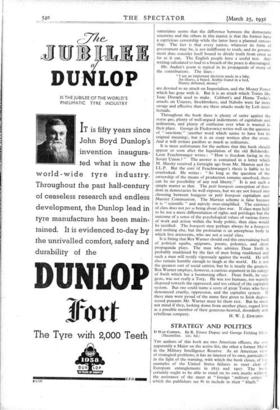RED CRUSADE
In Letters of Red. Edited by E. A. Osborne. (Michael Joseph. 6s.) THE advantage of being a Marxist Communist is that one can give a coherent or " scientific " account of one's faith. The disadvantage of being a Fascist is that there is no central or well-articulated doctrine known as Fascism. Fascism is a portmanteau word used to describe German racial " socialism," the Clerical Corporate State of Portugal, the Totalitarian Cor- porate State of Italy, Capitalism, Imperialism, Militarism, and effective resistance to Marxism. The " Left," in lumping together these very different things, is playing a dishonest political trick which is succeeding for a time.
In this book some twenty men, mostly Marxists, have aimed at a literary crusade against Fascism. In passing, one may express some surprise at their use of the word " crusade." They seem to be in the same literary tradition as Lord Beaver- brook and others who employ a Christian word for base and secular ends. St. Louis, King of France, they would probably call a Fascist.
By far the best contribution is Low's cartoon, attacking the Press censorship of " Fascist " countries. As political propa- ganda it has, however, been partly answered. For many years the conception of " literary " liberty has overshadowed all other derivatives of liberty. Low does not seem to see that there is, and will always be, a certain amount of restriction by govern- ment in literary matters, and this restriction exists in democratic countries and countries which own other forms of polity. It
sometimes seems that the difference between the democratic countries and the others in this matter is that the former have a capricious censorship while the latter have a planned censor- ship. The fact is that every nation, whatever its form of government may be, is not indifferent to truth, and its govern- ment does consider itself bound to divide truth from error as far as it can. The Ehglish people have a useful test. Any writing calculated to lead to a breach of the peace is discouraged.
Mr. Auden's poem is typical in its propaganda of many of the contributions. The lines :
" I see an important decision made in a lake,
An illness, a beard, Arabia found in a bed, Nanny defeated, money"
are devoted to an attack on Imperialism, and the Money Power which has gone with it. But it is an attack which Tories like Isaac Disraeli used to make. Cobbett's and Home Tooke's attacks on Usurers, Stockbrokers, and Nabobs were far more savage and effective than are these attacks made by Left intel- lectuals.
Throughout the book there is plenty of satire against the status quo, plenty of well-argued indictments of capitalism and militarism, and plenty of confusion over what is wanted in their place. George de Fiedorowicz writes well on the question of " sanctions " (another word which seems to have lost its original meaning), but it is an essay written after the event. And it will irritate pacifists as much as militarists.
It is most unfortunate for the authors that this book should appear so soon after the liquidation of the old Bolsheviks. Leon Feuchtwanger writes : " How is freedom faring in the Soviet Union ? " The answer is contained in a letter which M. Maisky received a fortnight ago from Mr. Maxton and the I.L.P. But the core Of Feuchtwanger's thesis is liable to be overlooked. He writes : " So long as the question of the ownership of the means of production remains unsolved, there can be no possibility of any real liberty." It is not such a simple matter as that. The petit bourgeois conception of free- dom in democracies he well exposes, but we are not forced into choosing between bourgeois or petit bourgeois capitalism and Marxist Communism. The Marxist scheme is false because it is " scientific " and naively over-simplified. The existence of class does not per se bring about class war. If class were held to be not a mere differentiation of rights and privileges but the outcome of a sense of the psychological values of various forms of work and action within the body politic, then class would be justified. The bourgeois may perhaps always be a bourgeois and nothing else, but the proletariat is an amorphous body in which live aristocrats, who are not a social class.
It is fitting that Rex Warner should end this entertaining book of political squibs, epigrams, poems, polemics, and short propaganda plays. The man who admires Dean Swift is probably maddened by the fact of men being maddened and such a man will testify vigorously against the world. He will also remain humble enough to laugh at the world. He is not the greatest sort of social satirist, but he is nearly the greatest. Rex Warner employs, however, a curious argument in his eulogy of Swift which has a boomerang effect. Dean Swift, he sug- gests, was not really a Tory, He was too humane, too warmly disposed towards the oppressed, and too critical of the capitalist system. But one could name a score of great Tories who have denounced cruelty, oppression, and the capitalist system. If these men were proud of the name first given to Irish dispos- sessed peasants Mr. Warner must let them rest. But he must not mind if they, looking down from another place, regard him as a possible member of their generous-hearted, disorderly and











































































 Previous page
Previous page